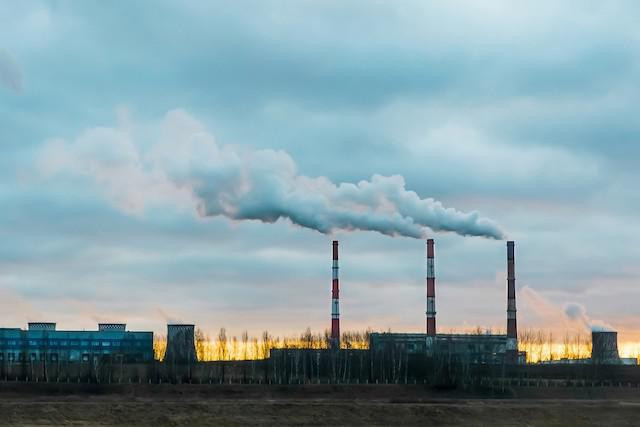The grand duchy is Europe’s largest and the world’s second-largest investment fund centre, with €4.8trn in assets under management at the end of November 2020, the latest available data by regulator CSSF shows.
“Luxembourgers are Europe’s biggest climate sinners. And yet, with a population of around 600,000, this is actually far from the country’s most serious impact on the global climate,” said Jennifer Morgan, Greenpeace International’s executive director, during a press conference on Wednedsay.
“The repercussions of the financial institutions are far more critical,” she said, highlighting that the emissions funded through the fund industry far exceed those of the country itself. “This, in a way, is the dirty secret of Luxembourg,” she said.
Heavy polluters
Measured against the MSCI World Index--a global index including more than 1,600 companies from different sectors of the economy--Luxembourg’s 100 biggest funds are on average 10% more emissions intensive, a study commissioned by Greenpeace said.
This results in an average carbon footprint of more than 70 tonnes of CO2 per million USD invested. The worst offender--an exchange traded fund--was 926% more emissions intensive than the MSCI benchmark.
Not only do funds invest in emissions-intensive sectors, in nine out of ten cases they also place money in particularly emissions-intensive companies within these sectors, Greenpeace said.
The fund sector far exceeds its carbon budget--the amount of CO2 it can emit until 2050 to limit global warming to 2°C. Nearly a quarter of the 100 biggest funds between 2014 and 2020 already used up their entire carbon budget that should have lasted them until 2050.
All 100 funds considered together will exceed their carbon budget starting 2027 unless they change their investment strategy. They are on track to contibute to a warming of the planet by at least 4°C, which scientists warn would leave large parts of Earth uninhabited and result in mass extinction and other emergencies.
The UN urges to limit global warming to 1.5°C, below the Paris Agreement goal of maximum 2°C.
Recognise responsibility
“We need to shift the discussion in Luxembourg. We talk a lot about the responsibility of households, of the industry and the transport sector, which is right, but what has currently not been discussed is the importance of the financed emissions via the Luxembourg fund industry,” said Martina Holbach, who leads climate campaigning at Greenpeace’s Luxembourg branch.
While Luxembourg markets itself as a sustainable financial centre, only 4% of assets under management can be considered sustainable, Holbach said, adding that the focus needs to shift to transforming the other 96%.
“There is ambitious regulation in France. There is an ambitious roadmap in the Great Britain. They are further along the way to a Paris-aligned financial sector than Luxembourg,” said Martin Granzow, a researcher at Nextra Consulting who carried out the study presented on 26 January.
“Luxembourg in the ranking in Europe is not under the top performers. They are more or less in the middle,” he said, adding that the shift to a fully sustainable financial centre could take decades.
The government is set to unveil a sustainable finance strategy. The document is currently undergoing a stakeholder consultation before being adopted by the cabinet under prime minister Xavier Bettel (DP).
Holbach said she was disappointed with the draft presented. Greenpeace was one of the organisations consulted and now hopes that its remarks will be taken into account for the document’s final version, for “a clear strategy with clear objectives, measures and timelines.”
Climate financial risks
Greenpeace also warned of the country’s biggest funds being exposed to climate financial risks.
Although the top 100 funds were less invested in fossil fuels than the MSCI benchmark, Greenpeace said that those exposed to fossil fuels were more heavily invested in coal, raising the risk of assets being stranded.
As more countries exit from coal as a source of power, coal is less likely to be mined, with the resource thus becoming stranded in the ground. It could also be of much lower value in future than it is now.
“Companies that are carbon intensive pose financial risks to asset managers,” Holbach said. “Even the fund managers do not know how much they are exposed to these financial risks. There needs to be an analysis where are we in Luxembourg and what could be done.”
With more than 25% of Luxembourg’s GDP, stranded assets pose a much larger risk. “Risks for the fund industry are risks for the wellbeing of the Luxembourg people,” said Granzow.
“Divestment doesn’t necessarily need to be the one measure that is the focus. There are other measures as well. Focusing on transforming companies would be interesting for sustainable acting investors and fund,” he said. “To find the companies who want to change, who invest in change to be in line with a Paris-compatible pathway is the target that needs to be in the focus.”
Luxembourg’s massive fund industry offers “huge potential” for shareholders to put pressure on companies to become more sustainable, Granzow said.
Delano on 29 January published a follow-up piece with reactions from the finance ministry, Luxembourg for Finance and fund industry association Alfi to the Greenpeace report.
